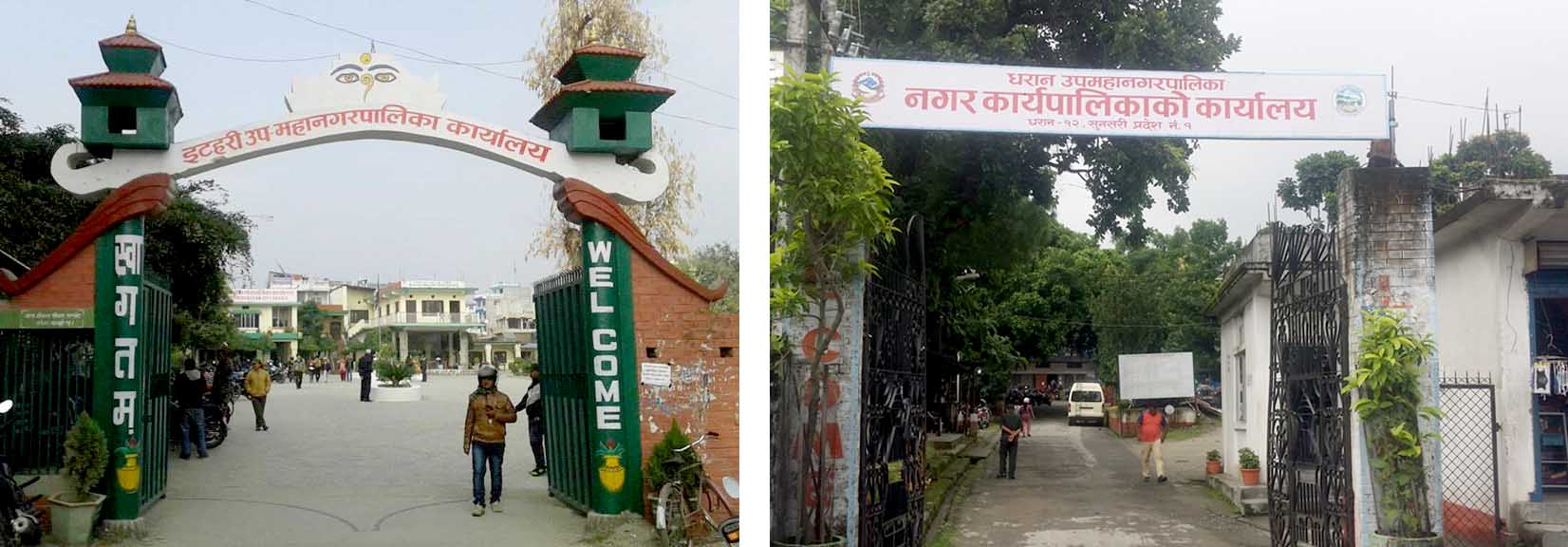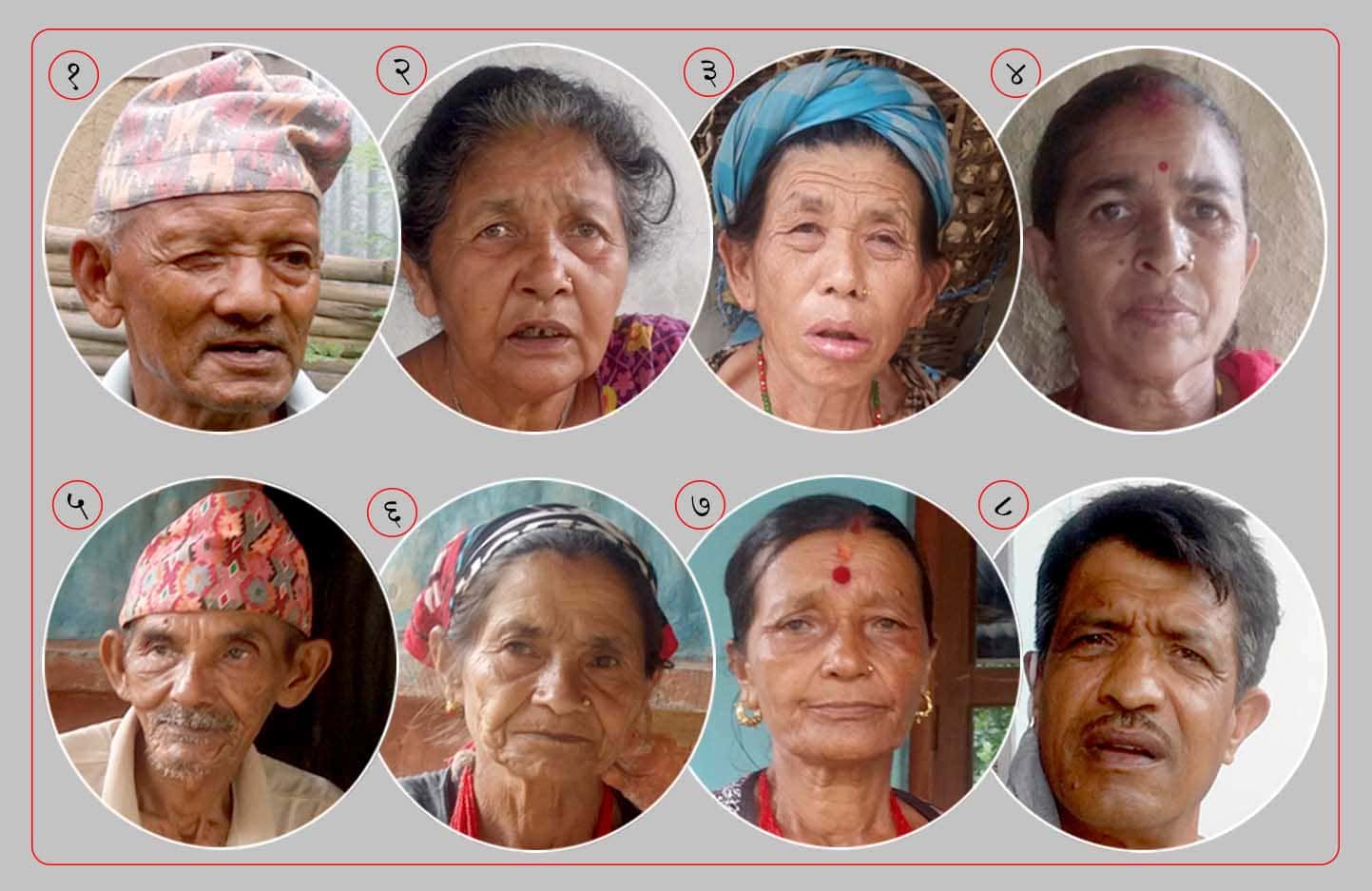Dharan and Itahari sub-metropolitan cities have made the citizens sick by dumping garbage indiscriminately and polluting the environment.
Gopal Dahal: Centre for Investigative Journalism-Nepal
Machhindra Ban, Badri Ban, Habbu Bishwakarma and Naramaya Puri died in the second week of January in Bhawanipur, Itahari-19. All of the deceased were over 50 years of age and everyone had reported respiratory ailments.
Srinarayan Chaudhary, chairman of Ward No. 19 said, “They [the deceased] were all suffering from asthma. At that time, the smoke billowing in the village had made it difficult even for healthy people to survive. ” According to him, garbage dumped by the Itahari sub-metropolis around Bhawanipur has caused a crisis in the environment and deteriorated the health of the people.
There are asthma patients and other respiratory ailments patients in every house in Bhawanipur. Toxic fumes from the garbage have made it difficult for most people over 50 to survive. Leela Giri, 65, of Bhawanipur and her husband Nara Bahadur Giri, 71, are victims of pollution. Leela, who has been to the hospital six times after the smoke from the village suffocated her made her throat feel sore, said, “In the past, we didn’t have such problems. The smoke made me fall ill; my husband also has asthma. We are surviving on drugs.”

Laxmi Chaulagain, 55, of Bhawanipur also has respiratory problems. He was treated at the BP Koirala Institute of Health Sciences, Dharan, for a week after falling seriously ill due to the smoke that spread across the village in January. At that time, he spent about Rs. 50,000 on his treatment. Chaulagain said, “After burning rubber and plastic, the smoke brings a burning sensation in our eyes and the suffocation it causes makes us feel as if we are breathing our last.”
In Bhawanipur, when smoke from the garbage started spreading, some people could not sleep at night and moved to another village. Those living in the village have to be rushed to the hospital overnight. Suresh Giri, 56, says, “I felt uneasy breathing and even speaking and I couldn’t walk. They called an auto rickshaw and took me to the hospital at night. It became easier to breathe only after we crossed the village.”
The family of Ishwar Poudel has been living near the garbage dump of Dharan Submetropolis for 20 years. Nine years ago, Ishwar and his wife, Kamala, had to face a lot of challenges due to the garbage. Their newborn son developed pneumonia and tonsillitis. According to Kamala, they have spent about Rs 700,000 on long-term treatments. Now, the son has asthma and medicine worth Rs 2,000 a month.
These cases show how garbage dumped by Dharan and Itahari sub-metropolitan cities has affected human settlements and the environment.
The youths of Bhawanipur staged an agitation in January by stopping the garbage truck after the smoke started making the local people sick. To prevent pollution, the Itahari Sub-metropolitan City, locals and the Waste and Environment Management Pvt Ltd, the contractor assigned to dispose the garbage, reached an agreement on February 2 to not set fire to the garbage.

Officials of Dharan sub-metropolis burning garbage on the street.
That agreement was limited to paper. Even now, the garbage of Itahari sub-metropolis is being dumped in the forest. Mandhwaj Moktan, chairman of the Waste and Environment Management, said they are dumping the garbage at the place designated by the sub-metropolis, as per the agreement. Moktan said, “In that past, another company used to dispose the waste. We have been disposing the garbage in the place specified by the city since 2018. After protests from locals, we have hired a staffer to prevent people from setting the waste on fire. ”
Food, plastic, glass, wire, paper, and cloth are all mixed in the garbage of the city. When the garbage is set on fire, smoke spreads in the settlements and forests. According to the World Health Organization (WHO), the burning of plastic generates fumes that pollute the air with harmful substances such as dioxins, furans, and particulate matter (PM 2.5 and PM 10).
According to Dr Rita Khadka, professor at the Department of Physiology, BP Koirala Institute of Health Sciences, Dharan, chemicals emitted after garbage is burnt cause problems such as asthma, cancer, heart attack, diabetes and joint pain. She said, “Plastic smoke can cause cancer in any part of the body. This pollution poses a greater risk for children, pregnant women, new mothers and the elderly.” Around 8,900 people from Itahari-19, including Bhawanipur, Brahmapur and Tamang Toll, are affected by the garbage dumped by the two cities. However, the cities haven’t taken the issue seriously so far.
Animals died, trees dried up
According to Dharan sub-metropolis, of 47 tons of garbage produced daily in the city, about 35 tons is dumped in an area belonging to the Bajho Gara Community Forest. Of the 37 tonnes of waste produced in Itahari, about 23 tonnes is dumped in an area belonging to Hansposa community forest. Dharan has been dumping garbage in Bajo Gara since 1986 and Itahari in Hansposa since five years ago.
Rajan Moktan, chairman of Banjho Gara Community Forest, said more than 300 plants and many large trees have died in the forest due to the garbage. “In the past, there were bees all over the forest. The smoke wiped out the bees, killing many birds and butterflies,”said Moktan. After wild boars and foxes ate the flesh of dead dogs dumped in the garbage, even their numbers declined. Smoke from the burning of garbage spread into the forest and the deer also died. ”

Garbage collected at Ramdhuni Kumarkhat’s farm.
Repeated requests to stop dumping the garbage in the forest and the even barricading the entrance to the forest have not stopped the dumping of garbage. Ishwori Bastola, a ranger at the Area Forest Office, Dharan, said that numerous plants and birds are dying and birds and animals have been displaced due to the garbage. Bastola said, “The garbage has greatly affected biodiversity. If left unmanaged, it can cause huge damages to the wild flora and fauna.” According to Rajendra Khanal, former head of IUCN Nepal, an environmentalist and conservationist, pores in plant leaves are blocked by dirt and smoke, and plants prepare their food without photosynthesis. Without oxygen, plants do not grow, get sick, and die. He said, “Such waste also pollutes the soil and water and affects crops. Humans, animals, and plants get sick,, and burning of waste also adds carbon to the atmosphere. ”
Damage to agriculture
Garbage dumps of Dharan and Itahari are located near Seuti river. When the rivers are flooded during the rainy season, the garbage reaches the farmers’ fields. Garbage from Itahari accumulates in forests and creeks of the border area of Bhawanipur. Dharan’s garbage is washed away by the river and reaches the farmer’s field in Kumarkhat, Ramdhuni Municipality-7. Plastic bottles, glass, syringes, various harmful items and sometimes even human organs have been found in the fields.
Keshav Gautam, chair of Ramdhuni-7, said yield has decreased due to such garbage. He estimated that the garbage has directly affected crops planted on around 135 hectare of f land. Gautam said, “When the flood comes, garbage is scattered all over the field. Farmers’ hands and feet get injured while working. There is a decline in production. ”
Mayor of Ramdhuni Municipality Jayanarayan Chaudhary said that the garbage is having a big impact on production and on human health. He said, “We are suffering from the garbage coming from upstream. We have asked local authorities to take steps to manage their waste many times but it hasn’t been done yet. ”

Those affected by garbage and air pollution: 1. Dhankumar Sarki 2. Satya Giri 3. Jukeshari Dewan 4. Laxmi Chaulagai 5. Narabahadur Giri 6. Lila Giri 7. Dhanmaya Giri 8. Suresh Giri. All have been suffering from respiratory tract infection infections
Dharan sub-metropolis had signed an agreement with Venture Waste and Energy Pvt Ltd in 2016 to generate gas from the garbage. However, there is still confusion as to where to dump non-recyclable waste, said Raju Chauhan, environment inspector at Dharan sub-metropolis. Bhesraj Ghimire, environment officer at Dharan Sub-metropolis, said that about two tons of garbage will be managed by constructing a landfill site in the forest. Mayor Tilak Rai said he hopes that the problem will be resolved soon as an agreement has been reached with a private company to manage the waste.
Waste and Environment Management Pvt. Ltd., which has been collecting garbage from Itahari, is also building infrastructure for recycling. Environment Officer Pushpanarayan Chaudhary said 10 per cent percent of non-recyclable garbage will be dumped into the landfill site. However, it is unknown when the work will be completed.
Both the sub-metropolitan admitted that the construction of the recycle plants was delayed due to the lockdown. Itahari’s Deputy Mayor Laxmi Gautam also said that the dumping of garbage will be stopped soon as the company managing the garbage is constructing a landfill site.
Garbage produced by about 300 pharmacies and clinics in Dharan and Itahari is also mixed in the city’s garbage without treatment. According to one expert, “Such waste may contain contaminants such as mercury from batteries, CFLs, and tubelights.”
According to environmental scientist Ram Charitra Sah, executive director at the Center for Public Health and Environment Promotion, Kathmandu, mercury is not destroyed even when it is burnt. It enters the human body and that of animals through air and water.
According to Sah, it impairs the nervous system, hearing and sight. It also has a negative effect on the kidneys, lungs and the reproductive system. Waste from health institutions releases harmful chemicals that affect human health and the environment. Hepatitis can be transmitted if the syringes and bottles are in the garbage if anyone is injured by them. Sah said, “Domestic garbage should not be thrown away indiscriminately.”
Bheshraj Ghimire, environment officer at Dharan sub-metropolis, said that health institutions in the city have been asked to dispose of garbage only after cleaning. But they have not been monitored due to lack of manpower, he said. Article 11 of the Local Government Act has given the responsibility of management of health-related waste to the local government. But Dharan and Itahari have not complied with the duties and responsibilities prescribed by the Act. Pushpanarayan Chaudhary, environment officer at Itahari sub-metropolis, admits that public health is being affected due to garbage in the city. Chaudhary said, “We are also under compulsion [to dump the waste].”
Article 30 of the constitution gives every citizen the right to live in a clean and healthy environment, while the Garbage Management Act, Environment Protection Act, Public Health Services Act and the Forest Act prohibit the indiscriminate dumping of garbage. Advocate Padma Bahadur Shrestha, an environmental lawyer, said Dharan and Itahari sub-metropolis have made a mockery of the punitively by polluting by not only shunning their responsibility of managing waste, but also by creating pollution themselves. He said, “Dharan and Itahari have flouted the constitution and laws. It is necessary to take legal action against those who hamper public health and the environment.”



